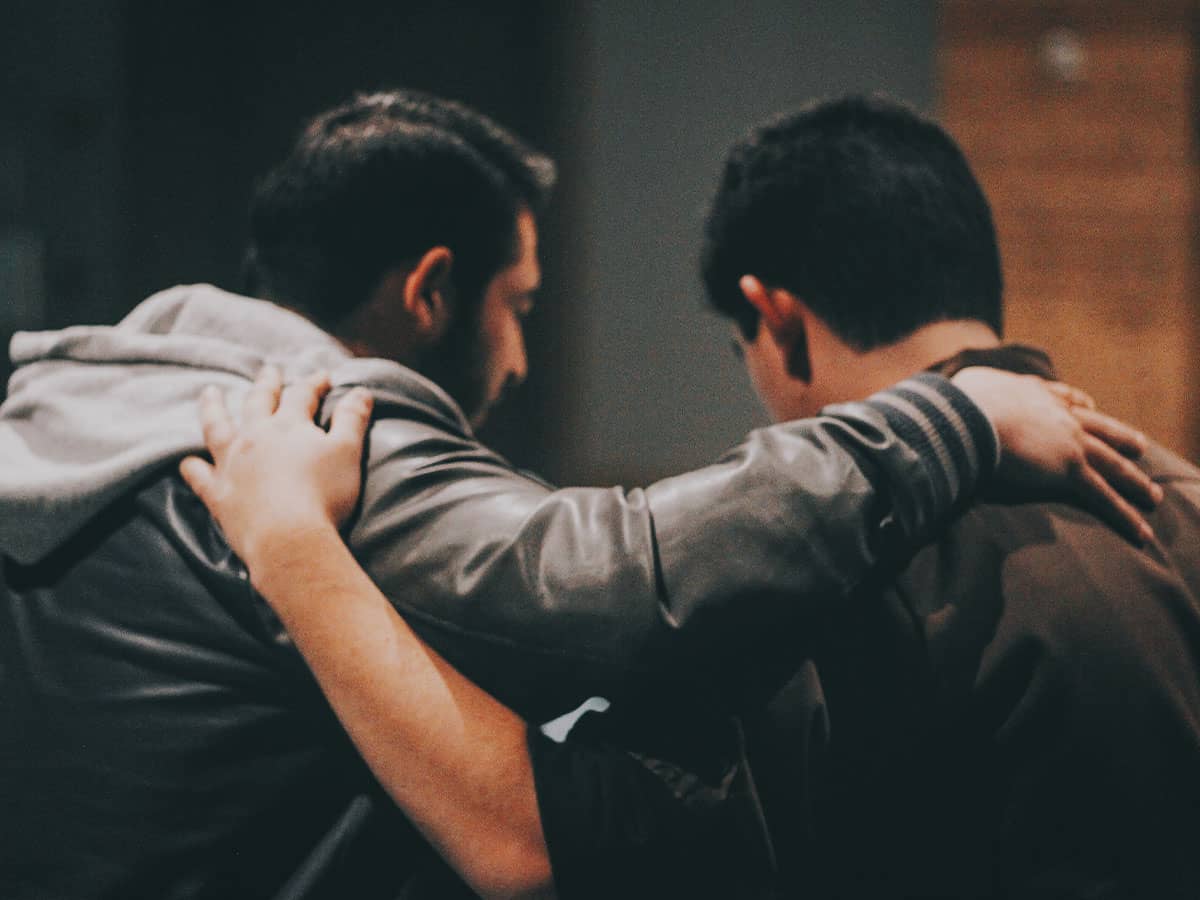
Millions of us walk alongside someone who is fighting an addiction.
How best can we help them? How do we look after ourselves along the way? What qualities must we develop if we are to help in a way that’s both effective and sustainable?
To answer those questions, we’ll draw inspiration from the wilderness journey of the Israelites.
Remember, recovery is possible but it takes time.
One in ten adults in the United States has resolved a substance abuse problem. Some got there without any help beyond that offered by family and friends. The majority found freedom with the support of a blend of services, including rehabs, outpatient programs, medication, and mutual-help groups such as Narcotics Anonymous, Sex Addicts Anonymous, and Celebrate Recovery. This is a remarkable story of hope! In fact, it represents 22.35 million unique stories of hope – living proofs that recovery is possible.
What must forty-long years in the wilderness have felt like? Deserts are draining, dangerous places. And yet, step by hard step, they followed his leading, and God prepared his people for life in the promised land. The wilderness is where much of God’s best work gets done.
The recovery process is rarely fast or straightforward, a reality that is hard to accept when faced with the suffering addiction leaves in its wake. There is, however, a real release that results from accepting the fact that addiction is a chronic disorder, and the pathways out are long, narrow, steep, and treacherous. As such, both lapses (brief slips) and relapses (prolonged returns to the addiction) are common.
The recovery journey is more like snakes and ladders, with its halting and precarious sense of progress, rather than the inevitable fall of a set of dominoes.
Reflecting their own experience of addiction, Deborah and David Beddoe write: “Grace allows time and space for transformation. People do change. People consumed by addiction can recover… But it’s a process. We forget this. It doesn’t happen overnight. Recovery takes endurance.”
Stay close to God.
As God’s people journeyed for forty years through the wilderness – homeless in a hostile land –their life orbited around the Tabernacle – a simple tent full of the presence of God! By day, a cloud hovered over it. By night, fire glowed inside the cloud so they could see it. If it moved, they moved. If not, they stayed put.
What sustained God's people in the desert? God himself. As they walked through the wilderness, he walked with them. As they woke each morning, he provided manna to feed them – one day at a time.
Accompanying a loved one on the journey through addiction is indescribably tough. It’s no one’s first choice. It requires patience, compassion, grace, strength, love, and hope in the kind of volumes only God can provide.
You are not alone. God is with you – Father, Son, and Holy Spirit. He is your ever-present help in trouble. He hears your cry. He’s concerned about your suffering. He empathizes with you, having experienced the dark depths of human pain and sorrow for himself. Of course, God loves your loved one – more than they could imagine! – but he loves you every bit as much.
You don’t have to carry this alone! Come before his throne of grace with confidence. Pour out your heart to him! He loves to hear your voice. As you walk with a loved one through addiction, let God himself be your refuge and strength.
Find your allies.
Navigating life in the wilderness was too much for Moses to handle alone! He’d led the people out of Egypt, across the Red Sea, and within touching distance of the promised land. Together, they’d seen wondrous miracles and endured great hardships. And yet, as his father-in-law, Jethro, said, “The work is too heavy for you; you cannot handle it alone.”
As we accompany others on the journey through addiction, we must recognize the limits of our capacity and responsibility. No matter the depth of our love, the strength of our determination, or the wisdom of our plans, there will always be a gap between what we desire and what we can make happen. We need to care wisely! Not just for our well-being but for the sake of those we seek to help.
In recovery from addiction, the individual sits in the driver’s seat. None of us can make the choices that lead to freedom for anyone else. And yet, we can’t overstate the role of relationships in recovery. Recovery happens in community. As the old Alcoholics Anonymous saying goes, “I can’t, but we can.”
What’s true for those in recovery is equally valid for those who accompany them along the way. You can’t do this alone! You need caregivers alongside you – allies who will listen, encourage, counsel, help, and pray with you. If you haven’t done so already, consider joining a support group such as Al-Anon (for the friends and families of alcoholics), Nar-Anon (for people affected by drug addiction), or a supportive group within your local church community.
Understand that before it's a problem, addiction is a solution.
Egypt wasn’t always a problem for the Israelites. In truth, after years of severe famine, Egypt was an answer to prayer! In the lands Pharoah gave them, God’s people found a source of peace, satisfaction, and security.
But it didn’t last. A new king came to power, who turned on the Israelites, and a place of refuge became a brutal prison. What was once a solution itself became a problem. Freedom turned to slavery.
Those who struggle with addiction tell a similar story. When drugs came into his life, my friend Huseyin says they delivered something far more valuable to him than a ‘buzz’ or a ‘high.’
“I’ve been traumatized,” he explains, “I’ve gone through parents divorcing, Dad going to prison, violence in the home, a whole incongruence between the culture at home and the culture of my community, as a Turkish kid growing up in North London. When I found drugs, it really helped me. When I first took heroin, I remember thinking, Why isn’t everyone doing this? Drug use was an answer to the way I was feeling. It was a solution, my first attempt at healing. I discovered something that worked, and it was fast-acting, so I grabbed it with both hands.”
Before it’s a problem, addiction is a solution.
As such, recovery from addiction involves finding healthy solutions to those underlying problems and addressing the relationship with the substance or activity itself. This demanding process often requires assistance from professionals, recovery mentors, and mutual-help groups. At first, recovery may not be possible without withdrawing to a safe environment, such as a residential rehab or the home of a supportive family member. It may require the daily attendance of a support group, like Alcoholics Anonymous, Gamblers Anonymous, or Celebrate Recovery. It may involve significant decisions about where we work, friendships and intimate relationships, financial commitments, and social activities. It may also require a period of Medication-Assisted Treatment (MAT).
In drugs, Huseyin found a way to satisfy genuine and legitimate needs. In recovery, he learned to meet those needs in life-giving ways, using many of the means listed above. However, he found the heartbeat of his recovery – and the primary solution to his underlying problems – in a relationship with Jesus Christ.
“If I’m using drugs and drugs work,” he says, “I’ve got to find something better, something that works. When I found recovery in the form of a relationship with Jesus and mentoring relationships with people who gave me something of themselves, it was a better solution. It stands the test of time. It’s the strongest; it holds the most water; it’s the kindest to me. I’ve found something that works.”
Recognize your limits.
As we accompany others on the journey through addiction, we must recognize the limits of our capacity and responsibility. No matter the depth of our love, the strength of our determination, or the wisdom of our plans, there will always be a gap between what we desire and what we can make happen.
The philosopher Martin Heidegger draws a helpful distinction between two ways of caring for others: “caretaking” and “caregiving.” Caretaking involves doing things for others, so they don’t have to do them themselves. Caretakers protect, provide, and solve problems on behalf of others. In contrast, caregiving “does not take the cares off the shoulders of its recipients.” Caregivers help others “pick up their own burdens and hoist them on their own shoulders.” They go ahead, clearing the way, making “it possible for the care receiver to assume his or her own proper, personal care.” Where caretaking (or enabling) disables, caregiving empowers.
To support someone in addiction without burning out, we need to learn to care wisely. Not just for our own well-being, but for the sake of those we seek to help.
Look to Jesus, our living hope
In the darkness of addiction, and the two steps forward, one step back, experience of recovery, it’s easy to lose hope. However, in Christ there is hope – living hope! – for all who are impacted by addiction.
Hope is the active ingredient – the caffeine in the coffee – of recovery. There is hope in addiction. Hope for healing. Hope for wholeness. Hope for freedom, restoration, a fresh start, and a different ending. Recovery is possible.
As you walk with a loved one through addiction, one day at a time, let the good news of the Gospel encourage you.
To the person enslaved by elements of their own self, to desires and habits that have taken on a life of their own, the Gospel is the good news that the living God can transform them from the inside out.
To the person who feels ashamed, empty, and alone, it’s the good news that the living God can free them with His pardon, soothe them with his peace, and animate them with His joy.
To the person who feels impotent and powerless, it is the good news that the living God wants to fill them with His Spirit and fortify them with his strength.
To the person who feels isolated – maybe even utterly abandoned – it’s the good news that there is a people (the church) among whom God’s loving presence rests.
To the person who tragically ends their life still in the grip of addiction, it’s the good news that though addiction may have won in this life, the victory of Christ guarantees total freedom in the life to come. Ultimate hope in addiction looks beyond today’s horizons in the wilderness to the return of Christ, the consummation of His kingdom, and the first sunrise in the true promised land.

